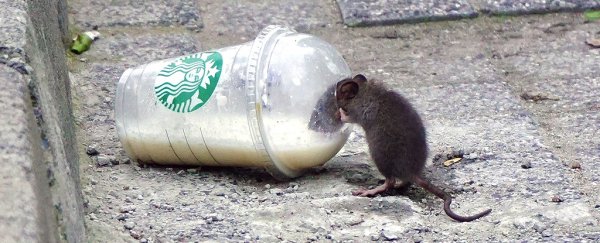Using loads of mice and a series of specialised diets, scientists have discovered that the rodents pile on weight when given a high-fat diet - but the same didn't happen when the mice ate a diet rich in sugar. And this raises questions about the role of sugar in human weight gain.
The discovery has led to some loud headlines, but before you race out to pile your shopping trolley with pasta and Pop-tarts, we need to emphasise the part that says this study was on mice. How it relates to human metabolism is up for debate - although it still makes for fascinating insight into what drives animals to eat.
Carbohydrates are either the devil or salvation, depending on who you ask and what form they take. Similarly, fats don't necessarily make us obese. Or maybe they do, affecting us even before we're born.
Confused? Yeah, so are we. There is one thing we can take from the wealth of studies on macronutrients and metabolism: teasing out the discrete effects of fat, carbohydrates, and protein on the human body is far from simple.
It would be a whole lot easier if we could stick a bunch of people into a box for a decade or two and restrict their diet and activity in controlled ways. Thankfully, a little thing called 'ethics' rules this out.
But ethics boards are more accommodating if those test subjects are mice, so researchers from the University of Aberdeen and the University of Chinese Academy of Sciences used the animals instead.
Specifically, the team put together a menu of around 30 different diets varying in proportions of fat, carbohydrate, and protein and fed them to nearly 1,000 mice in total.
Each rodent was designated two courses of menu items over three months, which for us would be like eating from the same buffet at the same restaurant for nine human years.
Using what we can only assume is the world's cutest magnetic resonance imaging ( MRI) machine, the mice had their body compositions mapped weekly in high detail. They also had their food intake monitored closely.
Towards the end of the experiment, the researchers measured the energy expenditure and physical activity of their little subjects.
Taking all of the data into account, there was a rather surprising outcome.
"The result of this enormous study was unequivocal – the only thing that made the mice get fat was eating more fat in their diets," says the study's senior researcher, John Speakman from the University of Aberdeen.
Not protein. Not carbohydrates. Just fats.
"Combining sugar with fat had no more impact than fat alone," says Speakman.
"These effects of dietary fat seemed to be because uniquely fat in the diet stimulated the reward centres in the brain, stimulating greater intake."
For rodent nutritionists desperate to get their clients to lose weight, this could be considered pretty big news. Mice can happily chow down on sweets and breads, only needing to worry about overindulging when they come across an all-you-can-eat smorgasbord of lard.
The researchers even identified the biochemistry behind it. They noticed changes in the kinds of signals associated with eating for pleasure, which included increased dopamine and opioid activity in the brain's hypothalamus.
When it comes to the eating habits of animals, there are competing models explaining what controls our behaviour.
One is the protein leverage hypothesis, which says we keep eating until we get all of the amino acids we need. Having fewer proteins in our diet drives us to eat more in general, causing us to gain weight.
This model was completely ruled out by the results, which instead supported something called the hedonic model. This states some nutrients make us happy when we eat them, encouraging us to eat more than our energy requirements.
The fact that sugar didn't trigger the same weight-gaining response in the mice is a clear surprise that warrants further investigation.
It's possible, if not likely, that the energy needs for mice and humans are different, therefore our brain's reward centres react to macronutrients in unique ways.
We have good reason to suspect sugar is an irresistible siren's call to our own pleasure centre, something we'd need to account for before dismissing its role in obesity.
"However, mice have lots of similarities to humans in their physiology and metabolism," says Speakman.
"And we are never going to do studies where the diets of humans are controlled in the same way for such long periods."
That makes studies like these invaluable in our efforts to understand links between eating and weight gain. But only if we take them with a pinch of salt and a generous helping of caveats.
This research was published in Cell Metabolism.
